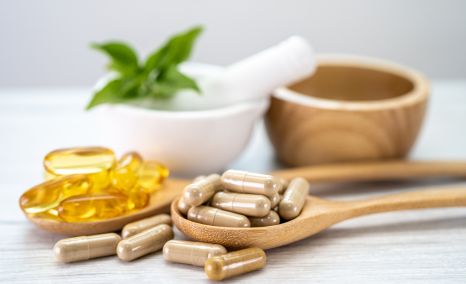What Is Herbal Medicine? A Comprehensive Exploration of Nature’s Healing Gift
Aug 02, 2023
Table of Contents
Herbal medicine, also known as traditional medicine, botanical medicine, herbalism, or natural medicine, is an ancient healing practice that dates back thousands of years. Herbal Medicine is part of the alternative medicine system, which encompassed several other forms of medical systems. As per the WHO, “Traditional medicine is the knowledge, skills and practices based on the theories, beliefs and experiences indigenous to different cultures, used in the maintenance of health and in the prevention, diagnosis, improvement or treatment of physical and mental illness.” Traditional medical systems come in a wide variety, and each one’s philosophy and practices are influenced by the local culture, environment, and historical context in which it first emerged. Despite this, all of these systems share a holistic outlook on life, a commitment to maintaining a balance between the mind, body, and environment, and a focus on health rather than illness. In order to improve health and treat a variety of illnesses, this Herbal Medicine makes use of the therapeutic qualities of plants and plant-derived substances. Herbal medicine has played a significant role in human civilization and laid the groundwork for contemporary pharmacology. Throughout history, several cultures have created distinctive herbal treatments that are all founded on an in-depth knowledge of the indigenous flora and its curative properties.
In recent years, several major developments have been observed in the Herbal Medicine market. The growing awareness and rising interest in herbal products have led to a greater demand for these plant-based medicines. Digital Health and E-commerce have simplified the reach of herbal products across geographies. India is one of the major markets for herbal medicine products. But however, over the past few years, the immense demand for herbal products has been registered in other geographical areas as well, including North America and Europe. Similarly, several companies are also actively operating in the market to tap the market share and generate revenue. With each passing day, new products are being introduced and launched in the market.
Downloads
Click Here To Get the Article in PDF
Understanding Herbal Medicine
Various plant components, including leaves, flowers, roots, stems, and seeds, as well as their extracts, are used in herbal therapy to treat a variety of medical ailments and diseases. Alkaloids, flavonoids, tannins, essential oils, and polyphenols are only a few of the natural substances that are abundant in these plants and contribute to their therapeutic characteristics. Practitioners of herbal medicine or herbalists have a thorough understanding of plants and how they interact with the human body. This knowledge is frequently passed down through the generations and may draw on regional folklore, empirical data, and academic study. Over the centuries, knowledge and insights into herbal medicine have led to the vast usage of these ingredients for various beneficial outcomes. Similarly, currently, several research and development activities are going to assess Herbal products’ benefits for bladder infection, anxiety, urinary tract infection, and high blood pressure, among others.
How Herbal Medicine is Prepared?
The preparation of herbal remedies can take several forms, each designed to extract and preserve the active compounds of the plant. Some of the most common methods include infusions, decoction, tinctures, salves, ointments, powders, and capsules. During the infusions process, steeping plant materials (leaves, flowers) is done in hot water to extract the medicinal compounds, similar to making tea. In the decoctions stage, utilizing tougher plant parts (roots, bark) is involved, in which material is boiled to extract the active ingredients. Decoctions are followed by tinctures in which the plant materials are soaked in water or other suitable solution to create concentrated extracts. Topical treatments are created by fusing herbs with oils, fats, or other solutions in the salves and ointments stage. Herbs that have been dried and crushed are put in capsules or combined with water for consumption. Depending on the ingredients and the type of Herbal Medicine, the product formation process may vary.
Example of Herbal Medicine and Their Use Case
The world is home to a diverse array of medicinal plants, each with unique therapeutic properties. There is a wide list of herbal medicines for various health benefits. Here are some of the best medicinal plants and their uses:
- Aloe Vera (Aloe barbadensis miller) – Aloe vera gel, extracted from the leaves, is renowned for its soothing properties on the skin. It is used to treat burns, wounds, and various skin conditions like eczema and psoriasis.
- Echinacea (Echinacea purpurea) – Echinacea is known for its immune-stimulating properties. Echinacea is useful in boosting the immune system and helping the body fight off colds, flu, and other infections.
- Ginger (Zingiber officinale) – Ginger has anti-inflammatory and digestive properties. It is commonly used to alleviate nausea, aid digestion, and reduce muscle soreness.
- Turmeric (Curcuma longa) – Turmeric contains curcumin, a potent anti-inflammatory compound. It is used to reduce inflammation, alleviate arthritis symptoms, and support overall joint health.
- Peppermint (Mentha piperita) – Peppermint is known for its calming effect on the digestive system. It is used to relieve indigestion, bloating, and irritable bowel syndrome (IBS) symptoms.
- Chamomile (Matricaria chamomilla) – Chamomile has mild sedative and anti-inflammatory properties. It is commonly used to promote relaxation, improve sleep quality, and soothe digestive issues.
- Lavender (Lavandula angustifolia) – Lavender has a calming and soothing aroma. It is used to reduce stress, anxiety, and insomnia. Lavender oil can also be applied topically to soothe minor skin irritations.
- Garlic (Allium sativum) – Garlic has antimicrobial properties and is known for its ability to support cardiovascular health by reducing blood pressure and cholesterol levels.
- Valerian (Valeriana officinalis) – Valerian root is a natural sedative used to treat insomnia and promote relaxation.
- Gotu Kola (Centella asiatica) – Gotu Kola is known for its potential to improve cognitive function, reduce anxiety, and support skin health.
- Rosemary (Rosmarinus officinalis) – Rosemary is a potent antioxidant and is often used as a natural preservative in food. It may also improve memory and concentration.
Are Herbal Medicine Really Helpful?
Herbal medicine can provide relief for a wide range of diseases and conditions. Herbal remedies are in use for centuries in various cultures and are known for their therapeutic properties. Many herbs have active constituents that can aid the body’s self-healing mechanisms, reduce symptoms, and enhance general health. Instead of only treating symptoms, herbal therapy takes a holistic approach, addressing the underlying causes of health problems. Additionally, compared to conventional medications, herbal therapies frequently have fewer negative effects. Although herbal medicine has potential benefits, it may not be appropriate for all conditions. When utilizing herbal treatments, however, issues with standardization, scientific validation, and potential interactions with pharmaceutical drugs can lead to some negative impacts on users’ trust and confidence. Depending on the particular health issue and personal preferences, practicality differs. Herbal medicine must be integrated into healthcare systems in a balanced way that addresses safety, quality, and effectiveness concerns while also acknowledging its potential benefits. Increased research and collaboration between traditional herbalists and the medical profession can help close the gap between herbal medicine and mainstream healthcare, giving patients more options for treatment to promote their well-being.
What are the Key Reason Behind the Growing Demand for Herbal Medicines?
There are a number of key factors for the rising herbal remedies demand at a global scale. As more and more individuals are looking for alternatives to traditional treatment, there is rising interest in natural and holistic healthcare options, and herbal medicine has emerged as the best alternative. Similarly, the rising awareness of self-care and wellness and the environmental and sustainability concerns, are other key factors for the growing demand for herbal medicine. Consumers who are health-conscious prefer herbal products since they are seen to be safer and have fewer adverse effects. Herbal medicine’s cultural importance and lengthy history of conventional use are other factors in its appeal. Additionally, some of the recent scientific studies confirm the effectiveness of specific herbs, medical experts are more likely to suggest or incorporate herbal medications into treatment strategies. Moreover, consumers are drawn to herbal products since they are made with natural ingredients and with regard to the environment in mind. Access to herbal medications is made easier by the growth of e-commerce and digital health platforms, enabling them to reach a wider audience. With increased research, professional collaboration, and enhanced regulation, herbal product demand is expected to grow at a significant scale in the upcoming years and will play a critical role in meeting the evolving healthcare needs of a diverse population across the globe and among people across different age groups.
Benefits and Useful Application of Herbal Medicine
Herbal medicine offers a multitude of benefits, drawing people’s attention toward its use as an alternative or complementary therapy to conventional medicine. Herbal medicine approaches health holistically, addressing the underlying causes of problems rather than just treating the symptoms. It seeks to reestablish harmony and balance inside the body, promoting general health. Many herbs have immune-boosting properties, helping the body fight off infections and prevent illnesses. From simple illnesses like colds, stomach problems, and skin concerns to chronic conditions like arthritis, anxiety, and sleeplessness, herbal medicine can be used to treat a wide range of medical conditions. Similarly, several studies are going on to assess the potential use of herbal medicine for bladder infections, urinary tract infections, high blood pressure, reduces inflammation, promotes digestive health, supports cognitive function (like memory and concentration), enhances skin health (such as burns, wounds, eczema, and acne), improve cardiovascular health, among others. Apart from health benefits, the other advantage of Herbal Medicine is that they are sustainable and environmentally friendly. Many herbal treatments can be obtained and grown responsibly, supporting environmentally friendly procedures and biodiversity preservation.
Key Challenges and Drawbacks of Herbal Medicine
Although herbal products have many advantages, it also has several disadvantages and difficulties that prevent their widespread use. To make wise choices regarding the use of herbal treatments, it is crucial to be aware of these potential downsides. In order to properly demonstrate their efficacy and safety, many herbal treatments lack rigorous scientific studies and clinical trials. Because of this, the efficacy of some herbal remedies is still debatable, and some claims may be supported more by folklore and anecdotal evidence than by hard scientific evidence.
Similarly, there is always some chance for potential side effects and allergies. Despite the fact that herbal medicines are typically regarded as being safer than pharmaceuticals, some people may still have adverse effects, including allergic responses. Some plants may interact with specific medicines, aggravate pre-existing diseases, or have negative effects on people who are vulnerable. It becomes important to consult the physician before utilizing herbal products, especially if the person is using other medications. While there are many problems for which herbal medicine might be helpful, there are other cases in which conventional treatment may be more appropriate and required, such as in emergencies or serious illnesses. There is a requirement for more intense research and scientific evaluation before using Herbal Medicine for some critical conditions. Similarly, there are some other major drawbacks and considerations such as lack of regulation, ethical considerations, potential contamination, variability in potency and quality, and misidentification and toxicity, which hampered the wide-scale adoption and user confidence in herbal products.

Major Companies in the Herbal Medicine Market
Globally, several companies are actively working in the herbal medicine market, offering a wide range of herbal remedies, supplements, and natural health products. The herbal products market is dynamic, however, few of the companies have very high dominance, across the product range and geographical areas. Himalaya Herbal Healthcare is one of the leading global herbal healthcare companies based in India, Himalaya offers a wide range of herbal products, including supplements, personal care products, and pharmaceuticals.
Similarly, 21ST Century HealthCare, Bach Flower Remedies, Baidyanath Pharmaceuticals, Bioforce AG, Blackmores, Blackmores Limited (Australia), Boiron, Cultivator Natural Products, Dabur India Limited, Emami Limited, Gaia Herbs, Hamdard Laboratories, Herbalife Nutrition, Nature’s Answer, Nature’s Way, Nutraceutical Corporation, Patanjali Ayurved Limited, Schwabe Group, Surya Herbals Limited, Traditional Medicinals, Weleda, and ZeinPharma Germany GmbH, are some others notable companies, having a very prominent presence in the global herbal medicine market. Owing to growing consumer interest and very high revenue prospects, several new companies and startups are expected to enter the Herbal Medicine Market in the near future with a wide range of products.
Herbal Medicine Market Outlook and Future Perspectives
Numerous advantages of herbal medicine make it a desirable option for anyone looking for natural and alternative healthcare options. Its widespread acceptance throughout numerous cultures around the world is a result of its holistic approach, lack of negative side effects, variety of applications, and cultural relevance. Due to rising consumer interest in natural and alternative healthcare options, the market for herbal medicines is expanding significantly. The market for herbal products appears to have a bright future due to a sustained trend toward natural and comprehensive healthcare options. Increased acceptance of herbal products by the public, and medical professionals and improvements in research, technology, and sustainable practices may result in more integration of herbal therapy into the modern healthcare system. Herbal medicine holds the potential to play an increasingly vital role in promoting overall well-being and bridging the gap between nature and healthcare.
Digital Health and E-commerce are other key factors expected to drive the Herbal products market growth. The rise of digital health platforms and e-commerce could facilitate easier access to herbal medicine products, reaching a broader global audience. A larger worldwide audience may have better access to herbal medicine goods thanks to the growth of digital health platforms and e-commerce. Partnerships and collaboration between herbal medicine companies and healthcare institutions may lead to innovative products and treatment approaches.
A well-rounded strategy that integrates the collected knowledge of conventional healing techniques with scientific research and contemporary healthcare standards is necessary to successfully integrate herbal therapy into the mainstream of healthcare. The Herbal Medicine market’s future course will be determined by a number of variables such as legislative changes, consumer preferences, and continuous scientific research. Herbal medicine is an age-old practice rooted in human history and continues to be a relevant and valuable healing modality in modern times. However, the herbal products market, like any other sector, will need to change with the times in order to be relevant to evolving consumer demands and the rapidly changing healthcare environment and its market dynamics.
Downloads
Article in PDF



